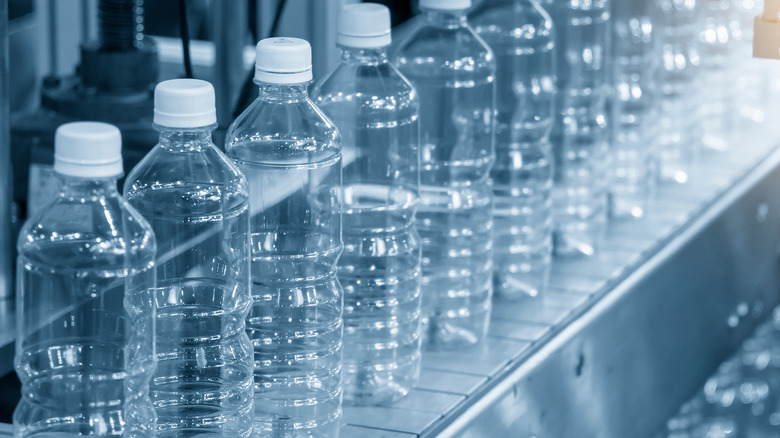The Downsides Of Drinking Bottled Water
If you're like most people, you carry a bottle of water with you just about everywhere. Hydration is important, but there are some downsides to drinking bottled water that you should know.
Bottled water might not be as pure as it appears. The Environmental Working Group conducted a study of ten brands of bottled water and found 38 pollutants in them. Heavy metals such as arsenic were discovered as well as toxic byproducts of disinfection and chlorination. In addition, radioactive isotopes and fertilizer residue were also discovered.
Pathogens are also a problem. In 2017, the U.S Food and Drug Administration (FDA) recalled FOR BABY water because it contained mold. And in 2014, Niagara Bottling LLC recalled 14 brands of water because of E. coli contamination (via the FDA). In addition, E. coli was found in Sweet Springs Valley Water Company water in 2019 (via Consumer Reports). In early 2021, Real Water recalled bottles because of a potential link to non-viral hepatitis, according to CBS.
Plastic and microplastics are major concerns
Along with toxic chemicals and byproducts, plastic bottles present another area of concern as the plastic itself leaches into the water. Most manufacturers have stopped using the compound bisphenol A (BPA) after it was linked to health effects including high blood pressure (via Mayo Clinic). However, bisphenol S (BPS), the replacement for BPA, could be just as bad. Scientific American noted that BPS is present in the urine of 81% of Americans. A 2013 study suggested that BPS can disrupt how cells normally perform, resulting in a variety of metabolic disorders such as asthma, birth defects, diabetes, and obesity.
A 2018 study revealed that a whopping 93% of 259 bottles from different companies around the world contained microplastic contamination (via The Guardian). Phthalates, which are microplastics, are known to disrupt the endocrine system (via Healthline).
The Centers for Disease Control and Prevention recommends when reaching for bottled water, that you check the label to see where it comes from and how it's treated. Popular brand Aquafina, for instance, is labeled as P.W.S., meaning it comes from a public water source before the purification process (via CBS). People with weakened immune systems should look for brands treated by reverse osmosis, filtration with a 1 micron filter, or distillation to protect against cryptosporidium.


